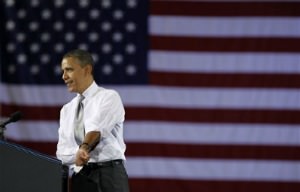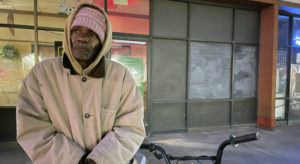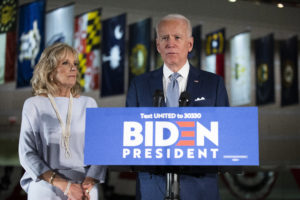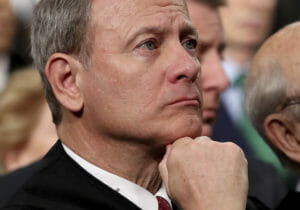Obama’s (Smaller) Army of Volunteers
The night after President Barack Obama's Affordable Care Act was being mercilessly attacked by U.S. Supreme Court conservatives, I was surprised to find a group of Obama volunteers cheerfully gathered in a nondescript office building east of Los Angeles to make phone calls for the president's campaign.I wondered at their good spirits. It was as though they hadn't heard about the hostile reception Obamacare had received at the Supreme Court.
The night after President Barack Obama’s Affordable Care Act was being mercilessly attacked by U.S. Supreme Court conservatives, I was surprised to find a group of Obama volunteers cheerfully gathered in a nondescript office building east of Los Angeles to make phone calls for the president’s campaign.
I wondered at their good spirits. It was as though they hadn’t heard about the hostile reception Obamacare had received at the Supreme Court.
But, as I learned, they knew about it and were fully aware of the tough fight Obama faces in November, no doubt against Mitt Romney, who by then will have remade himself into a faux centrist. Many of their phone calls — even to old Obama supporters — require a hard sell. And they know what’s at stake, including future appointments to the Supreme Court. I saw that their good cheer stemmed from determination and the belief they are well prepared for the battle ahead.
I visited these volunteers in Riverside, a city 60 miles east of Los Angeles in an area known as the Inland Empire. It was once agricultural, but the fields filled in with subdivisions during the housing boom. When it turned to bust, the Inland Empire was saddled with one of the nation’s highest foreclosure rates along with high unemployment.
About 10 volunteers scattered around several rooms in the office suite. “Some of his accomplishments aren’t being covered,” volunteer Theresa McManus told a reluctant person on the other end of the line. “I’d like to sit down with you.” Volunteer Lecia Elzig told another potential Obama campaign worker on the phone, “I’m retired, kind of free. What’s a good time for you to meet? We conduct our meetings at Starbucks, Coco’s or Carl’s Jr. I’d be happy to wait till 8 to accommodate you.” They finally agreed to gather at a Coffee Bean & Tea Leaf.
The volunteers did not make their calls at random, as I had learned from stories in Slate by Sasha Issenberg and from other publications. They worked from lists of names provided by the national Obama campaign from a centralized database, using a system called Vote Builder, which, The Guardian British newspaper reported, stores information on 190 million active voters. It includes age, postal address, ZIP code, occupation and voting history, such as party registration and frequency of voting. By using the ZIP code, the campaign data experts can pinpoint your census tract, and from that determine in a general way the income level, racial composition, family status and education level of your neighborhood.
The voter profiles can be expanded. Andrew Drechsler, vice president of Strategic Telemetry, a data gathering firm that worked for Obama in 2008, told the Voice of America program “This Is America” that data collectors buy information from companies that collect it from activities such as online purchases, market discount cards, credit records and motor vehicle registrations. “You know, what type of magazine do people read, what kind of car do they drive, do they rent, do they own, do they have pets, what sort of pet do they have?” he said.
In addition, the campaign has figured out how to use Facebook and its prodigious collection of information, plugging it into the central computer.
Republicans are using the same sort of methods, although the Obama campaign at this point may have the technological edge.
Such a centralized database, packed with so much personal information, concerns privacy advocates such as Jeff Chester of the Center for Digital Democracy, which watches digital advertising. He told The Guardian, “This is beyond J. Edgar Hoover’s dream. In its rush to exploit the power of digital data to win the election, the Obama campaign appears to be ignoring the ethical and moral implications.”
Such concerns weren’t evident as the Riverside volunteers made their phone calls, and I got a ground level view of how the system works. With California expected to be an easy win for Obama, their phone calls aim to sign up California volunteers and to connect with voters in battleground states such as Florida and Ohio. Working through a list from Obama headquarters, a volunteer looked for voters who weren’t Democrats but considered persuadable. For example, a registered Republican who owns a Prius might be induced to vote for Obama if she’s an environmentalist.
The volunteers marked down answers classifying the prospective supporters in battleground states as extremely likely, moderately likely and, finally, not likely at all to vote for Obama. When a page was completed, it was turned over to volunteer Bob Chupp, who entered the data, which went directly to Obama headquarters in Chicago.
The process is a bit scary. Whenever I buy a book from Amazon, I know that the details of my purchase will end up in my voter profile, begun when I registered on an Obama website. It would be the same with my purchases from a market, pharmacy or liquor store. If I had logged on to the campaign’s website through Facebook, all my Facebook friends would be put in the data mix.
But the volunteers in Riverside didn’t seem to feel put off by the process. Rather, they seemed to feel as though they were on a crusade. They know what’s at stake. “If the Supreme Court nixes health care, there will be a lot of people in a world of hurt,” said Chupp, looking up from his laptop.
To them the technology is a tool, helping them to their goal of re-electing Obama. They are as determined and serious as people I have encountered in the Occupy movement. Although Occupy wouldn’t agree, the Obama volunteers are also a movement that is essential to the survival of progressive politics.
Your support matters…Independent journalism is under threat and overshadowed by heavily funded mainstream media.
You can help level the playing field. Become a member.
Your tax-deductible contribution keeps us digging beneath the headlines to give you thought-provoking, investigative reporting and analysis that unearths what's really happening- without compromise.
Give today to support our courageous, independent journalists.









You need to be a supporter to comment.
There are currently no responses to this article.
Be the first to respond.